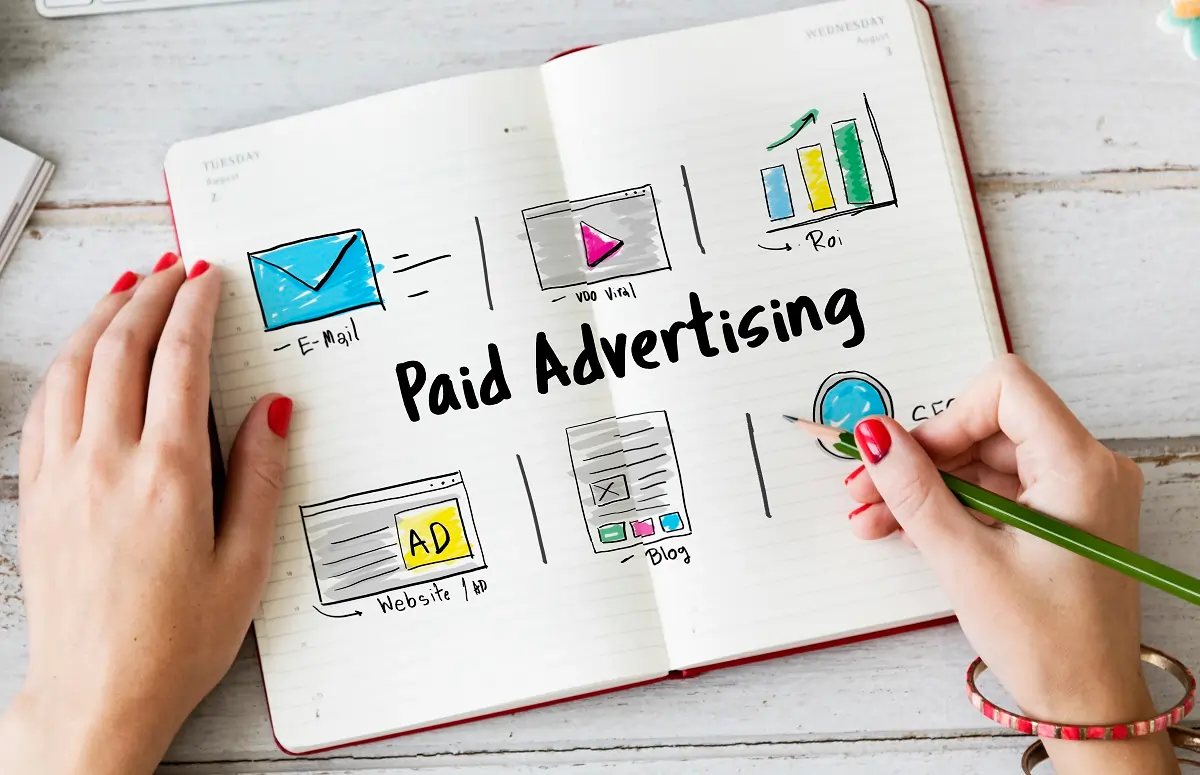The above question is one of the most fundamental questions that marketing professionals should be asking and trying to find an answer to. A scientific answer, based on empirical evidence, not inherited wisdom from industry “gurus”. But unfortunately our industry professionals rarely ask such existential questions, because, well, there is simply no incentive for us to question the efficacy of our craft.
But after having spent more than 15 years working as a marketer and promoting brands big and small, I thought I will play the devil’s advocate and question the efficacy of the most important activity that every marketer does.
So let’s address the elephant in the room by taking a critical look at TV, print and digital advertising and seeing if the empirical evidence supports all the hype around advertising.
The Truth About TV and Print Advertising
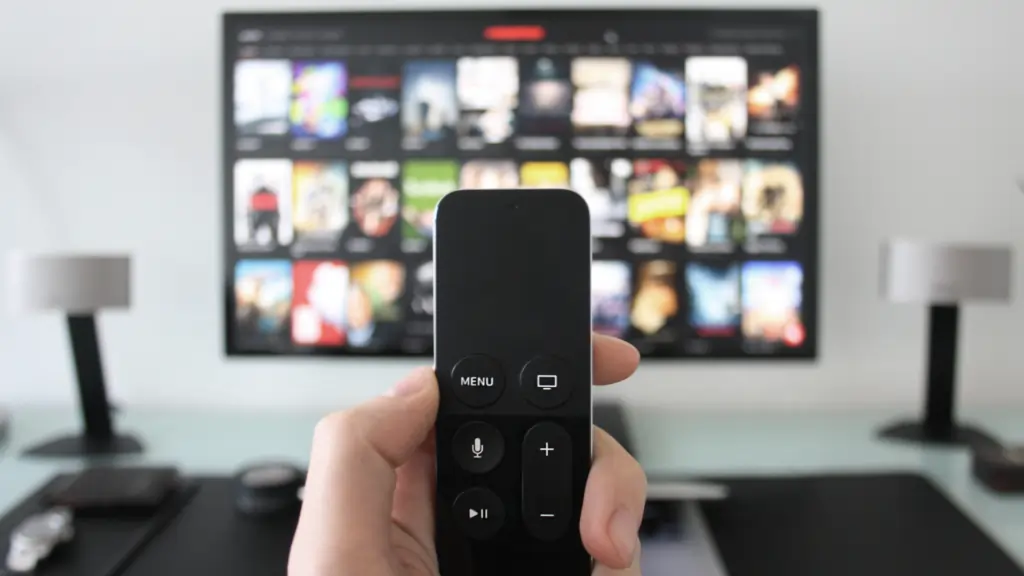
Anna Tuchman with Bradley Shapiro and Günter Hitsch, all three of them academics from well known business schools in the US, did a comprehensive research on TV Advertising three years back involving data from 288 consumer-packaged-goods brands that advertise regularly on TV and found out that there was negative ROI for more than 80% of the brands studied. Sure, advertising did have an impact on sales but it was so miniscule that the ad expenditure didn’t justify it. Hence the negative ROI.
Steve Levitt, of Freakonomics fame, did a randomised experiment with a big box US retailer (think Walmart or Target) which did newspaper ad inserts every week in all locations for many many years and never paused to think whether their ad investment was worth it. He convinced them to stop advertising in certain regions, and discovered that stopping ads in those locations had absolutely no impact at all on sales from those regions!
One point to clarify here.
Most marketing or advertising researchers need large sample data and hence work with data from the biggest advertisers (or well known brands). So empirical data from well known brands and bigger advertisers does suggest that advertising is largely ineffective.
But is it also true for unknown brands or lesser known brands that have just started advertising, or for certain use cases that require quick media reach and sales? I have a theory on that, but more on this later.
So if TV and print advertising for bigger brands is largely ineffective (or at best, highly overrated), then why do corporations still pump in millions of dollars every year on advertising?
Because organisations are driven by people and people don’t always think in purely economic or rational terms.
Think about it. Which CMO would pause and ask, “hold on, maybe one of my core job functions, isn’t of much use anyway”? Isn’t it better to say that “if billion dollar organisations spend millions of dollars in advertising every year and they have been doing so for many decades, advertising must be effective”?
And so the myth keeps propagating on.
So if advertising isn’t of much use in TV or print for large advertisers, is digital advertising any different? Isn’t digital advertising supposed to be more effective, with all the “advanced targeting options”, AI/ML and analytics?
The Myth of Digital Advertising Effectiveness
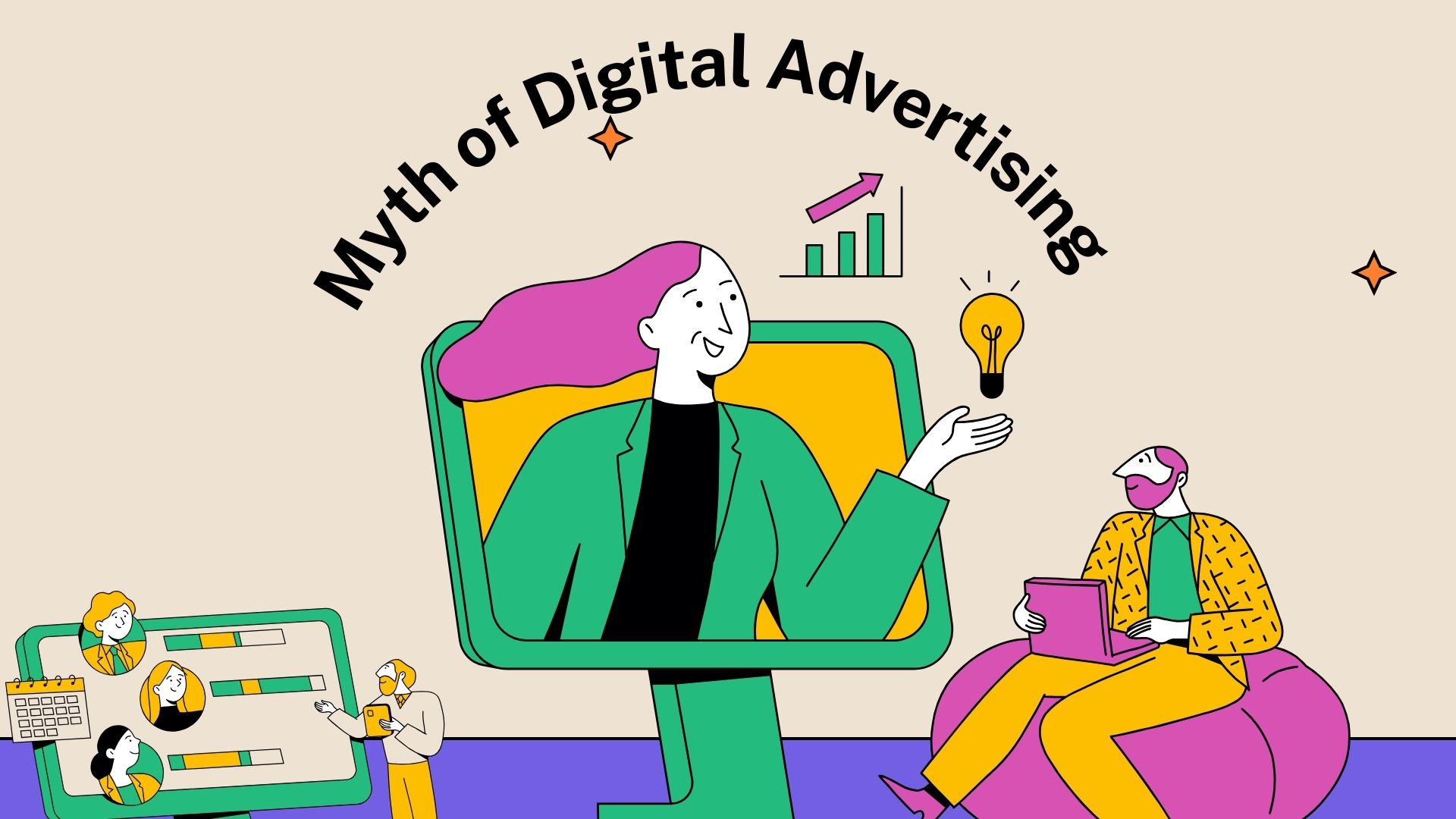
Challenging the effectiveness of digital ads with real-world experiments and data
Is digital advertising any different? Being a digital marketing professional, I am more interested in this.
Google and Facebook have become two of the most valuable tech companies in the world on the back of digital advertising.
And for Google an overwhelming majority of their ad revenue comes from search ads. In fact more than half of Google’s entire revenue (not just ad revenue) comes from search ads.
Search ads are generally considered the best revenue generator for businesses as they are predominantly performance oriented, meaning directly attributable online sales, leads or signups.
That’s why Steve Tadelis, along with two other fellow economists, did a large scale randomised experiment (results published in May, 2014), with search ads data from eBay, which, back then, used to spend half a billion dollars a year on online ads.
Steve convinced ebay to stop non branded (generic) search ads for a third of the regions where they were advertising. Ebay used to believe that search ads contributed to 5% of their revenue.
So with no search ads, their revenue in those regions should fall by 5 percent. And guess what? It dropped by just half a percent! And considering the huge cost of these ads, the ROI was overwhelmingly negative.
Ebay lost 60 cents on every dollar spent!
But what about branded search ads? Meaning ads which show when you search for a brand name? Every single digital marketing professional I have worked with, have always claimed branded search ads give the most bang for your buck. They will “show” you that branded search ads give the highest conversion rates at the lowest CPC with very high CTR.
But is that simply a correlation or are branded search ads the root cause of such metrics.
Unfortunately even the most experienced digital marketing professionals I have encountered have been victims of “correlation vs causation” fallacy.
Common sense would have you believe that people who are searching for products or services of your brand would anyway go to your organic link and buy from you. Why would you waste your money on such clicks which you can get for free!
This also explains why branded search ads have high conversion rates, not because the ads are more effective, but because people are already sold on your idea and would buy from you regardless of whether you show your ad or not.
“But if you don’t bid for your brand keywords, your competitor will, and you will lose business.” This is the most common retort I hear from experts.
Is there any empirical evidence from a fairly large dataset supporting these claims? Absolutely none!
Steve Tadelis found out from the ebay experiment that branded search ads had absolutely no impact on sales.
Even in cases when competitors like Amazon were bidding for ebay brand keywords. Customers would simply ignore such ads and still go to ebay organic links.
Branded search ads, whether you bid for your brand keywords or competitors brand keywords are a complete waste of money.
But what about display/video ads?
The Display Advertising Blackbox
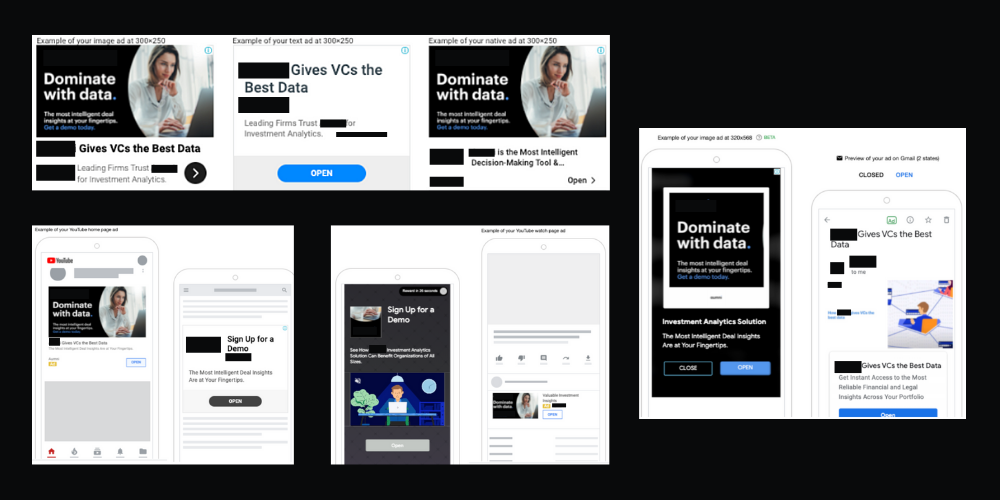
The truth about display ads: Low engagement and poor ROI.
Let’s take a deeper look at display/video ads.
I don’t need to present any research data to say that display ads (those pesky banner ads you see, or ignore, on websites) are pretty bad at generating ROI. Our industry accepts this fact and that’s why all agencies and digital marketing experts would recommend banner ads for “branding”.
But how good are banner ads even for that?
In 2016 research company Lumen installed eye tracking cameras on 300 consumers’ laptops and found that only 35% of display ads received any views at all. And of those only 9% received more than a second’s worth of attention and only 4% got more than 2 second attention.
It’s no wonder then that display ads give an abysmal CTR of around 0.1% on average. And even the precious few clicks you get, more than half are accidental clicks.
Digital video ads are better at branding and engagement than static display ads, but not as effective as agencies or media companies like YouTube or Facebook would like you to believe.
Facebook considers a video view as someone watching a video for a mere 3 seconds! YouTube is slightly better but still just 10 seconds. And unless you have changed the settings, most platforms play videos by default.
Big brands, especially in the US where digital media spending is over indexed, have started to realize that the lofty claims of precision and ROI in digital media is mostly BS.
The theoretical promise of digital advertising is great – you get to show the right ad to the right person at the right time. But the reality is that nobody has absolutely any clue if this is actually happening.
Look, I am by no means claiming that all advertising by all companies is always a waste of money. I am a marketer and advertising does have a role to play in marketing. If you are an ad professional you would have, at some point, seen massive sales or brand recognition happen due to ad campaigns.
What I am trying to drive at is that advertising (including digital advertising), in general, is extremely overrated. And the hype is created by parties with vested interests.
Major Ad agency networks would cease to wield the kind of power they do if the biggest advertisers drastically slashed their ad budgets.
Digital ad platforms like Meta or Google, would lose their mojo if they don’t misattribute much of the organic sales and conversions to their ad platform.
Digital advertising “experts” will lose business if they don’t project digital ads as the “solution” for all the “problems” Print and TV ads have.
So if advertising is not always ineffective, when and for whom is it effective?
The Diminishing Marginal Returns of Advertising

As brands mature, advertising’s effectiveness declines, leading to diminishing returns.
By now you might have drawn the conclusion that advertising doesn’t really work.
And if you are going to argue that advertising is done not just for ROI but also for “creating lasting brand memories” or staying on “top of mind” of consumers, I am going to suggest you ask yourself why are these branding metrics desirable? For their own sake or for eventually generating more business?
If you keep asking enough questions, every marketing activity boils down to ROI.
So what is my conclusion?
My hypothesis is that advertising works for some and doesn’t work for some others. Who it works for and who it doesn’t depends on what stage of the brand journey they are in.
I think advertising returns follow a normal distribution or bell curve.
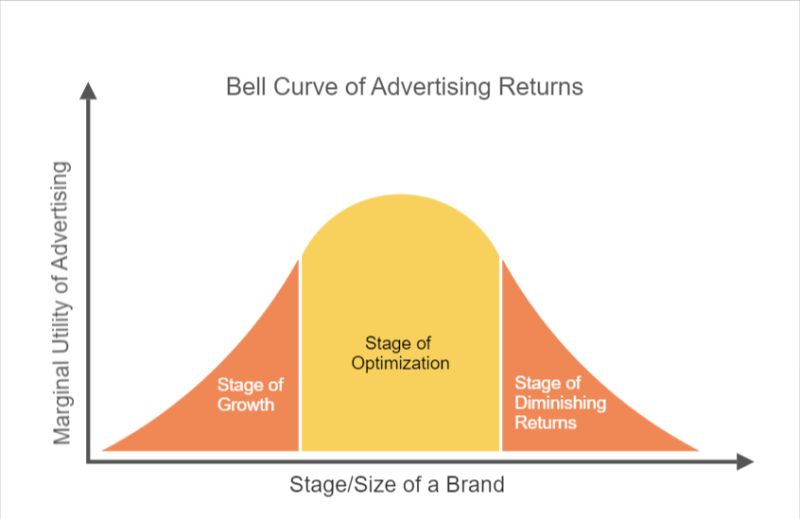
For brands in the growth stage it gives increasing marginal utility till they reach a point of optimization where the returns are maximised.
After this point, which is applicable for most mature brands or large advertisers, advertising (whether offline or online) has diminishing marginal utility.
Of course, this is only a hypothesis and I have no way of proving it. Unless someone runs large scale experiments with companies at different stages of their branding journey, nobody can say for sure if this hypothesis is always true or not.
I have worked with SMEs all my career and I have personally generated good ROI (not just ROAS) from digital advertising spends.
I have also seen brands being launched through mass media advertising and sales skyrocketing thereafter.
But the problem happens when companies see initial returns on advertising they simply assume that the returns will keep on coming if they continue scaling up their advertising.
Plus there is the added fear of losing out on market share if advertising is stopped for an extended period once the brand has reached a stage of maturity.
So brands end up spending more and more on advertising. And hardly anyone ever stops to run experiments or to ask if there might be a better way of maintaining or even increasing market share once the brand recognition is there.
Even for the initial growth phase of a brand’s journey, is advertising the only way to generate sales and grow?
Not at all. There are many brands like Dmart, Zerodha, Xiaomi, Zara, Tupperware, etc. that grew massively without any aggressive advertising.
So even if you don’t change your go-to-market or growth strategy and drive those with advertising, there is merit in pausing and thinking if there might be a better way.
About The Author
Get A Free Consultation
I can help you grow your B2B business.
Ready to Generate 40-80+ Qualified Leads/Month?
Get a free 30-minute Growth Blueprint call. You’ll learn:
- Your current cost per lead vs. industry benchmarks
- Which channels are leaving money on the table for firms like yours
- A 90-day roadmap to predictable lead generation
- Specific positioning recommendations for your segment
No sales pitch. Just honest advice.

